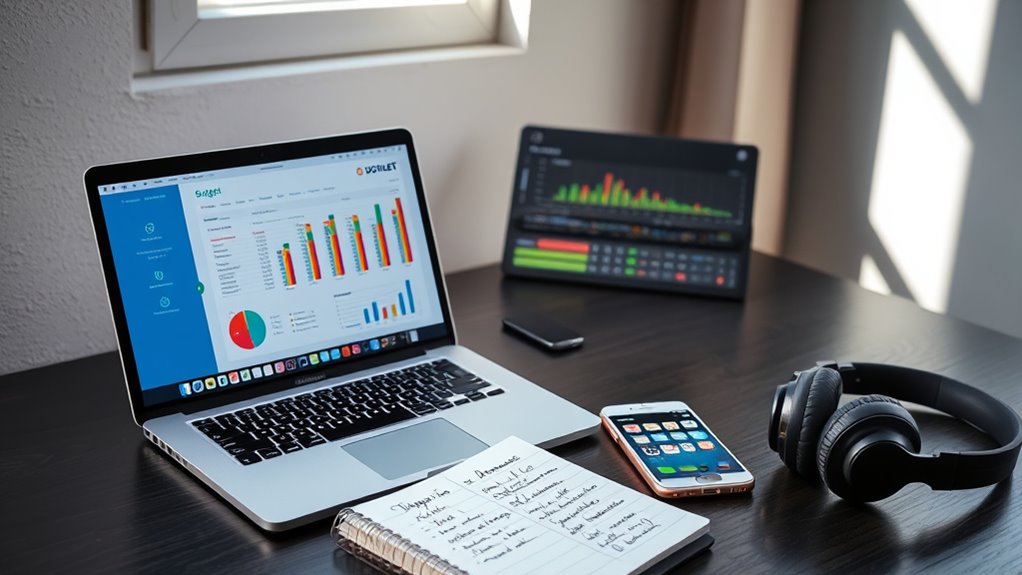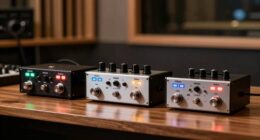To manage your freelance music career effectively, it’s essential to use budget templates that help track income and expenses, plan for unpredictable months, and set clear financial goals. These tools make it easier to organize earnings from gigs, lessons, and royalties while keeping expenses like equipment and marketing in check. By maintaining a realistic budget and building an emergency fund, you’ll gain financial clarity and security. Keep exploring to discover practical templates and tips tailored for your unique career needs.
Key Takeaways
- Use dedicated budget templates to track income streams like gigs, lessons, royalties, and expenses such as equipment and marketing costs.
- Regularly monitor cash flow to identify irregularities and adjust spending or saving strategies accordingly.
- Incorporate income diversification into your budget to manage seasonal fluctuations and build financial stability.
- Set clear financial goals and use templates to track progress toward income milestones and savings targets.
- Leverage customizable budget tools to streamline tax prep, identify cost-saving opportunities, and plan for long-term financial security.
Assessing Your Income and Expenses

Have you ever wondered where your money comes from and where it goes? As a freelance musician, it’s essential to assess your income and expenses carefully. Start by tracking your earnings from gigs, music licensing, and other sources. Don’t forget to account for equipment costs, which can be significant—upgrading gear or replacing instruments adds up quickly. Knowing your total income helps you identify your cash flow patterns, while understanding your expenses allows you to spot areas where you can cut back. Create a simple budget that lists your income streams and recurring costs. This snapshot gives you clarity about your financial health and sets the foundation for smart planning, ensuring you’re prepared for both busy months and leaner times. Paying attention to equipment costs is especially important, as they can have a substantial impact on your overall budget and long-term financial stability.
Building an Emergency Fund for Unpredictable Months

Unexpected challenges can disrupt your income at any time, making it crucial to build an emergency fund. This safety net should cover three to six months of your essential expenses, giving you stability during unpredictable months. To grow your emergency fund, consider smart investment strategies that balance liquidity and growth, like high-yield savings accounts or short-term bonds. Keep in mind the tax implications of your investments; some may be taxed differently, affecting your overall savings. Regularly contributing to your emergency fund ensures you’re prepared for sudden gaps in income, whether due to canceled gigs or unexpected expenses. Prioritize building this reserve early, as it provides peace of mind and financial flexibility, allowing you to focus on your music without constant worry.
Creating a Realistic Monthly Budget

To create a realistic monthly budget, you need to estimate how income can fluctuate and plan accordingly. Tracking your expenses accurately helps identify where your money goes and reveals areas to cut back. By understanding both income variability and expenses, you can develop a budget that keeps your finances stable. Incorporating financial planning tools can further enhance your ability to manage irregular income effectively.
Estimating Income Variability
Estimating income variability is essential for creating a realistic monthly budget as a freelance musician. The music industry often involves unpredictable earnings, so understanding this fluctuation helps you plan effectively. To account for variability, consider these factors:
- Track your income over several months to identify patterns and seasonal trends.
- Incorporate income diversification strategies, like teaching, session work, and gigs, to stabilize cash flow.
- Build a financial cushion or emergency fund to cover months with lower earnings.
- Recognize how music therapy integration and sound healing practices can contribute to additional income streams, providing further stability during lean periods.
Tracking Expenses Accurately
Accurately tracking your expenses is essential for creating a realistic monthly budget that reflects your true financial situation. When you record every expense—whether it’s for equipment, marketing, or daily living—you gain clarity on where your money goes. This insight helps you develop effective investment strategies, ensuring your savings grow and your finances remain healthy. Proper expense tracking also simplifies tax planning by keeping detailed records of deductible costs, reducing surprises during tax season. By regularly reviewing your expenses, you can identify patterns, cut unnecessary spending, and allocate funds more efficiently. This disciplined approach enables you to set achievable financial goals, manage cash flow better, and build a sustainable income as a freelance musician. Incorporating budget templates can further streamline this process and keep your financial goals on track.
Setting Financial Goals for Your Music Career

Setting clear financial goals is essential for turning your passion for music into a sustainable career. Without them, it’s easy to lose focus or miss opportunities, especially in areas like music marketing and equipment investments. To start, define specific targets such as income milestones or project goals. Next, prioritize your expenses, balancing investments in quality equipment with marketing efforts to grow your audience. Finally, set timelines to review and adjust your goals, ensuring you stay on track. Consider goals like increasing gig income by a certain percentage or saving for new equipment. These objectives will guide your spending and help you measure progress, making your music career more focused and financially stable. Additionally, understanding the importance of family photoshoot fails can remind you that unexpected challenges may arise, so flexibility in your planning is key.
Tracking Your Spending and Income Effectively

Once you’ve established clear financial goals, the next step is to keep close track of your spending and income. Accurate records help you identify where your money goes and guarantee you’re maximizing tax deductions, which can lower your tax bill. Use a dedicated system or budget template to log every income source, including gig payments and royalties, and all expenses, like equipment and travel costs. This habit also reveals investment opportunities—areas where you can save or grow your money, such as retirement accounts or savings plans. Additionally, utilizing energy-efficient models can help reduce ongoing costs, especially if you use your equipment or appliances frequently. Consistent tracking makes it easier to prepare taxes, avoid overspending, and stay aligned with your financial goals. By staying disciplined, you gain better control over your finances, ensuring your music career remains sustainable and profitable.
Utilizing Budget Templates to Stay Organized
Using budget templates can help you stay organized and on top of your finances. You’ll find customizable options that fit your unique income and expense streams, making tracking easier. With these tools, managing your financial overview becomes straightforward and less stressful. Incorporating nutrient-rich ingredients into your planning can enhance your financial health by ensuring you allocate resources effectively for your needs.
Customizable Template Options
Have you ever struggled to keep track of your income and expenses as a freelance musician? Customizable template options can help you tailor your budget to fit your unique needs. With flexible templates, you can track income sources like concert revenue and music licensing more accurately. Additionally, incorporating budget templates for financial planning can assist you in managing your retirement savings and investment strategies effectively. Consider these features:
- Adjust categories to include income streams specific to you, such as online streaming royalties or teaching fees.
- Modify expense categories to cover equipment, marketing, or travel costs.
- Add formulas that automatically calculate your net income, helping you stay on top of your financial health.
Tracking Income & Expenses
Tracking your income and expenses regularly is key to maintaining financial clarity as a freelance musician. Using budget templates helps you stay organized and spot areas to improve. Record income from gigs, music licensing, and lessons, and track expenses like instrument maintenance and marketing costs. This practice allows you to identify cost-saving opportunities and optimize your financial management. It keeps you aware of cash flow and tax obligations. To illustrate, here’s a simple table to monitor your finances:
| Income Sources | Expenses |
|---|---|
| Gigs & performances | Instrument maintenance |
| Music licensing fees | Marketing & promotion |
| Teaching lessons | Equipment repairs |
| Streaming royalties | Studio rent |
| Merchandise sales | Travel expenses |
Staying on top of these details ensures you’re prepared for taxes and future planning.
Simplifying Financial Oversight
To keep your finances organized and manageable, leveraging budget templates can make a significant difference. They help you track income, expenses, and savings goals effectively. Using templates, you can:
- Identify potential tax deductions, such as instrument purchases or studio rentals, to maximize your savings.
- Monitor your spending habits to stay within budget and plan for irregular income streams.
- Incorporate retirement planning by setting aside a portion of your earnings regularly, ensuring long-term financial security.
- Recognizing gaslighting tactics associated with narcissistic behaviors can help you maintain clear boundaries and avoid financial manipulation.
Frequently Asked Questions
How Often Should I Review and Update My Budget Templates?
You should review and update your budget templates at least quarterly to stay on top of your finances. Regular reviews help you adjust for changes in income, expenses, or contract negotiations. This way, you can refine your marketing strategies and guarantee your budget aligns with your current goals. Staying proactive keeps your financial plan accurate and effective, allowing you to adapt quickly to opportunities or challenges in your freelance music career.
What Are the Best Tools for Tracking Freelance Income?
Imagine you’re managing income from music licensing and performing at venues; tracking these streams efficiently is key. Using tools like QuickBooks Self-Employed helps you monitor your freelance income, categorize earnings, and prepare for taxes. It seamlessly integrates with bank accounts, giving you real-time updates. This way, you stay on top of revenue from various sources, ensuring your financial planning remains accurate and all-encompassing.
How Can I Manage Irregular Cash Flow Effectively?
To manage irregular cash flow effectively, you should focus on cash flow management by setting aside a buffer for lean periods and tracking your expenses carefully. Use expense tracking tools to monitor your spending, so you know where your money goes. This helps you plan better, avoid surprises, and guarantee you have enough funds during slow times. Regularly reviewing your cash flow and adjusting your budget keeps you financially stable.
What Tax Considerations Should Freelance Musicians Be Aware Of?
Tax considerations are the roadmap guiding your financial journey. You should be aware of potential tax deductions like equipment, travel, and home office expenses that can lower your bill. Also, make estimated payments to avoid surprises at tax time—think of it as paying in installments to stay on the right side of the taxman. Staying organized and consulting a tax pro helps you navigate these waters smoothly.
How Do I Balance Saving for Retirement With Current Expenses?
To balance saving for retirement with current expenses, start by creating a budget that includes both priorities. Build an emergency fund covering three to six months of expenses first. Then, explore investment strategies like IRAs or tax-advantaged accounts to grow your retirement savings. Regularly review your finances, adjusting contributions as your income fluctuates, ensuring you can meet immediate needs while steadily building your future security.
Conclusion
With wise budgeting and careful tracking, you’ll transform turbulent months into triumphant milestones. By building a budget that balances, a plan that persists, and a goal that guides, you’ll guard your finances and grow your gig. Embrace the discipline of diligent documentation and the power of planning—your path to a prosperous, stress-free music career is within reach. Stay structured, stay inspired, and let your financial future flourish with confidence and clarity.










